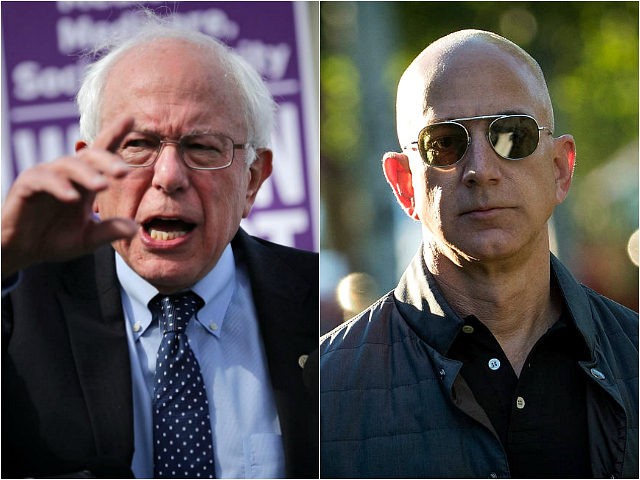Sen. Bernie Sanders (I-VT) threw some not-so-subtle shade at Amazon and its CEO Jeff Bezos on Wednesday when he introduced a bill that would allow the government to charge big corporations for the federal welfare programs its low-income workers use.
The “Stop BEZOS Act,” which stands for “Stop Bad Employers by Zeroing Out Subsidies Act,” would stick big companies with a bill for federal welfare programs commonly used by their low-wage workers and stem the flow taxpayer-funded subsidies for companies paying their workers low wages.
“At a time of massive income and wealth inequality, when the 3 wealthiest people in America own more wealth than the bottom 50 percent and when 52 percent of all new income goes to the top one percent, the American people are tired of subsidizing multi-billionaires who own some of the largest and most profitable corporations in America,” Sanders said in a statement.
The Vermont senator said that Amazon — which became the second company to be valued at over $1 trillion on Tuesday — is one of the companies responsible for using the federal government to subsidize its workforce, paying more than half of its employees an average of $13.67 an hour, or $28,500 a year.
Sanders also cited a recent report from the New Food Economy, which found that one in three Amazon employees in Arizona received food stamps in 2017.
Amazon, however, refuted those statistics in a blog post, claiming that the company provides “highly competitive wages” and “a comprehensive benefits package including health insurance, disability insurance, retirement savings plans, and company stock” to its employees.
The trend of Amazon employees receiving food stamps is nothing new, however. Another report from January found that more than 1,400 Amazon workers in Ohio were on food stamps, and ten percent of company employees in the area claimed some form of federal assistance.
The online retail giant not only relies on the government to subsidize their workforce, but it is also one of the top sponsors of the H-1B visa — which is extended to foreign workers. The company requested 2,515 H-1B visas for foreign workers in 2017, far surpassing the number of foreign workers requested by companies like Google and Facebook.
But the trend of companies like Amazon relying on the government to help provide cheap labor, largely from other countries, may already be on the downswing.
Because President Donald Trump recently placed a cap on the number of foreign workers entering the U.S., Bezos and other retail warehouse employers are being pressured to increase their wages for their massive workforce and potentially rely less on imported labor.

COMMENTS
Please let us know if you're having issues with commenting.